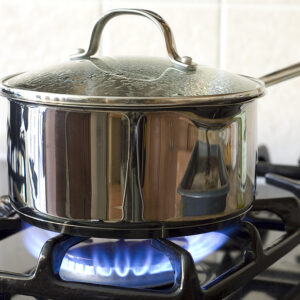Consumers and natural gas companies kicked off 2024 with unexpectedly good news when the U.S. Ninth Circuit of Appeals affirmed its decision blocking the nation’s first ban on natural gas hook ups.
The ruling, issued by a three-judge panel last April, found the federal “Energy Policy and Conservation Act preempts a City of Berkeley regulation that prohibits the installation of natural gas piping within newly constructed buildings.” That law gives the U.S. Department of Energy the power to regulate commercial kitchen products, including natural gas-powered stoves and ovens.
From city halls to state capitals to the White House, Democrats across the U.S. — including here in the Keystone State — have been attempting to restrict or ban new natural gas hookups as part of their policy to address global climate change. Berkeley went first, banning natural gas piping in new construction by changing the city’s building code in 2019. Now, the full court has unanimously agreed that the federal law’s preemption provision included building codes “that regulate natural gas use by covered products.”
That decision will be felt in Pennsylvania, America’s second-largest producer of natural gas and a state where 47 percent of households rely on natural gas or propane for heat, far more than electricity (29 percent) or heating oil (20 percent).
Keystone State progressives continue pushing for a zero-carbon, all-electric energy infrastructure. Philadelphia has an energy master plan pledging to “generate or buy 100 percent of all electricity from renewable resources by 2030,” for example.
In 2022, then-Gov. Tom Wolf (D) vetoed a bipartisan bill protecting consumer choice by preventing local governments from banning any form of energy, including natural gas. All three Democrats in the Delaware Valley delegation voted against a similar federal bill, the “Gas Stove Protection and Freedom Act.”
The 9th Circuit’s decision ends the argument, said Kurt Knaus of the Pennsylvania Energy Infrastructure Alliance (PEIA).
“Any municipality that might be thinking about banning natural gas hookups should think again,” Knaus told DVJournal. “The court decision is a clear shot across the bow. It’s painfully clear now this was a politically motivated overstep.”
Kevin Moody of the Pennsylvania Independent Oil & Gas Association agreed the court sent a strong message on gas pipeline bans. “They shouldn’t do it,” he told DVJournal. “Our industry has been against these bans since we heard about them…We believe it’s about energy choice and, certainly, the restaurants brought this actions in California and for good reason because it really has a significant adverse effect on their businesses.”
Polls — and consumer behavior — show Americans support the court’s decision. A 2021 national Morning Consult poll found, “When it comes to the choice between natural gas and electricity for cooking, natural gas is still the favored choice: 73 percent of respondents who prefer to keep their gas stoves said they’ve used both and electric ‘did not work as well as gas alternatives.’”
“Pennsylvanians recognize the tremendous value of natural gas, especially during the winter months, and they understand what it means for our overall economic and environmental health,” said Knaus. “The whole notion of banning a regulated utility service is misguided, which is why the flawed policy approach has never really caught on here.”
And natural gas has been good for the state’s economy. A Marcellus Shale Coalition (MSC) analysis last fall found the industry brought in $41 billion in economic activity to Pennsylvania and $3.2 billion in state and local revenue.
“There’s broad, public support for natural gas development and use, and we applaud the Ninth Circuit’s decision to uphold the consumer’s choice over their energy sources,” MSC President David Callahan said. “Natural gas provides significant economic and environmental benefits, and coordinated efforts to ban its use merely advance misguided political agendas over the best interest of Americans and their freedoms.”
Environmentalists insist the debate isn’t over. Sierra Club attorney Jim Dennison told Grist, a news organization focused on promoting green climate policy, that there’s a lot of motivation in cities to “address emissions from their buildings, which are an incredibly important source of climate and health-harming pollution.”
The only way Berkeley could get the law reinstated is if the U.S. Supreme Court takes up the case. The city hasn’t announced if it will appeal.
Meanwhile, a lawsuit over New York state’s gas stove ban is pending in federal court.

